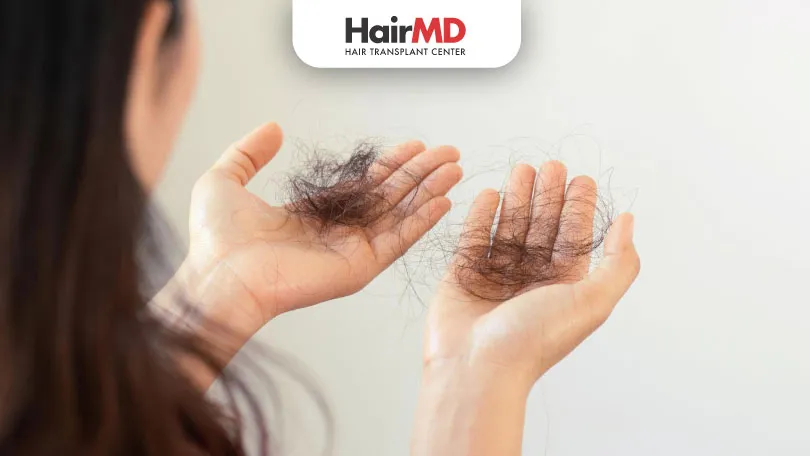13th January, 2025

Your hair fall could be telling you more than you think. Decode the signs with expert tips!
Hair loss can feel like a daily frustration, but what if it’s more than just a cosmetic issue? Excessive hair fall, noticeable thinning, or bald patches could signal an underlying health condition that requires attention. Let’s explore the reasons behind hair loss and discover actionable steps you can take to regain control of your hair health.
At HairMD, we believe in holistic care, addressing not just the visible symptoms but the root causes of hair concerns. If you’re worried about hair loss, this guide will help you understand the potential reasons and the solutions available.
What’s covered in the article?
- What is Normal Hair Loss?
- Common Health Conditions Linked to Hair Loss
- Preventive Lifestyle Tips for Hair Health
- When to Seek Professional Help?
- Conclusion
What is Normal Hair Loss?
Hair naturally grows in cycles, and losing 50–100 strands a day is completely normal. This is simply part of the natural regeneration process. However, if you notice sudden, excessive hair shedding, large clumps of hair in your comb, or visible bald spots, this could be a red flag pointing to something more serious within your body.
The good news? By addressing the root cause, you can often manage or even reverse the problem.
Tips for Identifying Problematic Hair Loss:
- Monitor how much hair you’re losing during combing or washing.
- Look for thinning areas or bald spots in photos or in the mirror.
- Pay attention to symptoms like fatigue, weight changes, or skin dryness that could be linked to hair fall.
Now, let’s explore how hair loss may be tied to other health conditions.
Common Health Conditions Linked to Hair Loss
1. Thyroid Problems
The thyroid gland regulates many body functions, including hair growth.
Hypothyroidism or hyperthyroidism can disrupt your hair growth cycle, leading to hair thinning or shedding.
Signs to Look Out For:
- Fatigue, sudden weight gain/loss, dry skin, or cold sensitivity.
- Hair becoming brittle or thinning significantly.
Actionable Steps:
- Get a thyroid function test if you suspect an imbalance.
- Follow prescribed treatments, such as medications or dietary changes, to manage thyroid health. A balanced intake of iodine (found in iodized salt, fish, and dairy) can also support thyroid function.
2. Nutritional Deficiencies
Nutrition plays a pivotal role in maintaining healthy hair. Deficiencies in key nutrients like iron, zinc, biotin, and vitamin D can lead to hair shedding.
Actionable Steps:
- Include iron-rich foods like spinach, lentils, tofu, and chicken in your meals.
- Zinc-boosting foods such as nuts, seeds, and whole grains are beneficial.
- Get adequate sunlight exposure or consider vitamin D supplements.
Consulting a nutritionist or getting a blood test to identify deficiencies can set you on the right path.
3. Polycystic Ovarian Syndrome (PCOS)
PCOS, a hormonal disorder affecting women, is a leading cause of hair thinning and baldness.
Common Symptoms:
- Thinning hair on the scalp but excessive hair growth on the face or body.
- Irregular periods, acne, and obesity.
Actionable Steps:
- Work with a gynaecologist and a dermatologist from trusted clinics like HairMD.
- Manage PCOS with regular exercise, maintaining a healthy weight, and reducing sugar and refined carbs in your diet.
4. Autoimmune Disorders
Autoimmune conditions like Alopecia Areata or lupus occur when the immune system attacks healthy cells, including hair follicles.
Signs to Look Out For:
- Round patches of hair loss on the scalp or body.
Actionable Steps:
- Visit a dermatologist promptly if you suspect autoimmune-related hair loss.
- Treatments like corticosteroid injections or immunotherapies may be effective.
5. Stress and Mental Health
Chronic stress can push your hair into the “resting” phase, causing temporary shedding, also known as Telogen Effluvium.
Actionable Steps:
- Practice stress management techniques like yoga, meditation, or journaling.
- Ensure proper sleep hygiene (7–8 hours of quality sleep per night).
- Balance work-life demands by incorporating calming hobbies or physical activity into your daily routine.
6. Hormonal Imbalances
Periods of hormonal change, such as pregnancy, postpartum, or menopause, can trigger noticeable hair shedding.
Postpartum Hair Loss Tips:
- Use gentle, sulfate-free hair products.
- Avoid excessive styling or heat damage to your hair.
- Stay patient—it usually resolves within six months.
Hormonal replacement therapy (HRT) or other medical interventions can help women experiencing severe menopause-related hair thinning. Consult a gynaecologist to tailor treatment.
7. Scalp Infections
Ringworm or other infections often show visible signs like itching, redness, or flaky patches on the scalp.
Actionable Steps:
- Seek help from a dermatologist at HairMD Clinic Pune.
- Use prescribed antifungal shampoos or medications.
- Maintain good scalp hygiene and avoid sharing combs or towels.
8. Chronic Illnesses and Medication
Chronic conditions like diabetes or lupus and medications including chemotherapy drugs or antidepressants can induce hair loss.
Actionable Steps:
- Discuss alternative treatments or dosage adjustments with your doctor.
- Complement medical treatments with nourishing practices like scalp massages or using hair oils infused with rosemary or amla.
Preventive Lifestyle Tips for Hair Health
Your hair health reflects your overall lifestyle and habits. Simple daily changes can make a big difference.
1. Eat a Balanced Diet:
Ensure your meals include proteins, healthy fats, and vital nutrients like iron, vitamin C, and biotin.
2. Practice Good Hair Hygiene:
Avoid harsh shampoos with sulfates or alcohol. Wash your hair regularly but not excessively—2–3 times a week is ideal for most people.
3. Protect From Environmental Damage:
- Cover your hair under harsh sun or pollution.
- Use protective sprays or conditioners against heat styling tools
4. Stay Hydrated:
Hair strands need moisture too! Aim for 8–10 glasses of water daily.
5. Schedule Regular Check-ups:
Visit a dermatologist annually to prevent hair or scalp-related surprises. Clinics like HairMD Clinic Pune offer advanced diagnostic and treatment options tailored to your needs.
When to Seek Professional Help?
If persistent hair loss concerns you, consulting an expert is the best course of action. Delayed intervention can lead to irreversible damage. Seek a professional opinion if you notice:
- Sudden or patchy hair loss with no obvious explanation.
- Scalp irritation, pain, or redness.
- Hair loss combined with symptoms like fatigue or weight changes.
At HairMD Pune, our skilled dermatologists can diagnose the root cause of your hair loss and provide state-of-the-art solutions to restore your confidence.
Do You Know?
Nearly 250 Patients Visit HairMD
Everyday For Various Hair Concerns?
(Your journey to healthier and fuller hair starts here!)
Meet Our Dermatologists
Conclusion
Hair loss isn’t always just about losing hair—it’s often a message from your body about underlying health issues. The sooner you act, the better your chances of managing it successfully. By improving your diet, seeking help for stress, balancing hormones, and consulting experts like those at HairMD Clinic Pune, you can reclaim not just your hair, but your overall sense of well-being.
Take charge today! Make an appointment with trusted experts and start your journey toward healthier hair and a healthier you.
Further Reading
How to Assess and Improve Hair Density at Home?
Want thicker, healthier hair? Learn simple ways to boost and Measure hair density at home with natural tips and expert advice.
Ultimate Food Guide For Healthy Hair
Discover the Food For Healthy Hair. Learn how nutrients like biotin, zinc, and omega-3 fatty acids contribute to hair strength and shine.
केस पांढरे होण्याची कारणे व उपाय (Causes of Gray Hair)
केस पांढरे होण्याची कारणे व त्यावर घरगुती उपाय जाणून घ्या!
Essential Winter Hair Care Tips for Moisture & Shine
Combat winter’s dry, cold air with these essential hair care tips to keep your locks moisturized and frizz-free all season long.
Have thoughts? Please let us know
We are committed not only to treating you, but also educating you.












